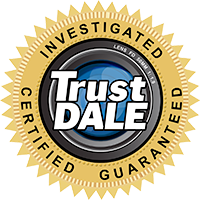Understanding Foundation Settlement

Your home is more than just a place to live; it's an investment in your future. Ensuring its structural integrity is paramount to safeguarding your investment. One of the most critical aspects of your home's structure is its foundation. Foundation settlement, though often subtle, can have profound implications if left unaddressed. In this comprehensive guide, we'll explore in depth the signs of foundation settlement and equip you with the knowledge to detect and address them promptly.
Before delving into the signs, let's first understand what foundation settlement entails. Foundation settlement occurs when the soil beneath a structure compresses or shifts, causing the foundation to sink or become uneven. This can lead to various issues, including structural damage, cracked walls, and compromised stability. Factors such as soil type, moisture levels, and construction methods can all contribute to foundation settlement.
Signs Your Home Is Settling
Cracks in Walls and Floors: One of the most common indicators of foundation settlement is the appearance of cracks in interior and exterior walls, as well as in flooring materials such as tiles or hardwood. These cracks may start small but can widen over time, signaling ongoing settlement. Pay attention to the size, location, and direction of cracks, as they can provide valuable insights into the extent of the settlement.
Misaligned and Sticking Windows and Doors: Noticeable misalignment of doors and windows, such as difficulty in opening or closing them smoothly, can indicate foundation settlement. This occurs as the shifting foundation causes the frame of the house to distort, affecting the alignment of doors and windows. Keep an eye out for gaps or uneven gaps around door frames and window sills.
Uneven Floors: If you notice that the floors in your home are no longer level or have developed slopes or dips, it could be a sign of foundation settlement. Use a level to check the flatness of floors, particularly in older homes or those built on expansive clay soils. Pay attention to areas where flooring transitions occur, as they are common locations for unevenness.
Stair-Step Cracks: Exterior masonry, such as brick or concrete block walls, may develop stair-step cracks, which resemble a series of steps. These cracks typically occur near corners or along mortar joints and are indicative of foundation movement. Monitor these cracks for changes in size or shape, as they can provide valuable clues about the progression of settlement.

Gap between Exterior Walls and Roofline: A visible gap between the top of the exterior walls and the roofline can indicate that the foundation has settled, causing the walls to separate from the structure above. Inspect the exterior of your home from ground level to identify any gaps or signs of separation between the walls and roofline.
Sagging or Uneven Roof: Foundation settlement can also affect the roofline, leading to sagging or uneven areas. If you notice dips or depressions in your roof, it's essential to investigate further for potential foundation issues. Look for signs of roof damage, such as missing or cracked shingles, which can exacerbate the effects of settlement.
Sagging or Uneven Roof: Foundation settlement can also affect the roofline, leading to sagging or uneven areas. If you notice dips or depressions in your roof, it's essential to investigate further for potential foundation issues. Look for signs of roof damage, such as missing or cracked shingles, which can exacerbate the effects of settlement.
Cracks in Chimney: Finally, inspect the chimney for signs of settlement, such as leaning or separation from the main structure. Cracks in the chimney or gaps between the chimney and the house are red flags that warrant immediate attention. Chimney settlement can pose serious safety risks, as it can lead to chimney collapse or structural instability.

Frontier Can Help!
Being proactive in identifying and addressing signs of foundation settlement is key to preserving the structural integrity of your home. If you notice any of the aforementioned indicators, it's advisable to consult with a qualified foundation specialist promptly. Remember, early intervention can prevent costly repairs down the line and ensure the long-term stability of your home. By staying vigilant and proactive, you can protect your investment and enjoy peace of mind knowing that your home is built on a solid foundation. At Frontier Foundation & Crawl Space Repair, we provide FREE, no-obligation inspections and quotes. Contact us or schedule an appointment online today!
 4.9
4.9 



